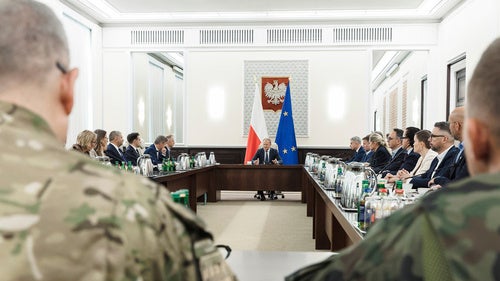Americans Support Using US Troops To Defend Poland

Roughly six in 10 favor using US troops if Russia were to invade a NATO ally like Poland or Latvia, Lithuania and Estonia.
On Wednesday, NATO fighter jets were deployed to shoot down a pack of Russian drones that crossed into Polish airspace. The next day, the foreign ministers of Lithuania, Poland and Ukraine released a joint statement describing the incident as a “deliberate and coordinated strike constituting an unprecedented provocation and escalation of tension.” US President Donald Trump has raised the possibility that the incursion could have been a mistake, and NATO is investigating whether the incident was deliberate or accidental.
If deliberate, several analysts describe the move as a test for NATO and for the Trump administration’s commitment to European security. The 2025 Chicago Council Survey, fielded July 18-30, finds eight in 10 Americans say they would support using US troops if a US ally is invaded (82%). While support is lower when Americans are presented with specific scenarios, it is still at majority levels. Roughly six in 10 would favor using US troops “if Russia invades a NATO ally like Poland” (62%, with majorities across political affiliations) and “if Russia invades a NATO ally like Latvia, Lithuania, and Estonia (55%). In 2024, two-thirds said they would favor using US troops “if Russian invades a NATO ally, like Germany.” Of course, these results are posed as hypothetical scenarios; media coverage as well as leaders’ statements around an actual event could influence public opinion in either direction.
This drone incursion coincides with a Trump administration review of American troops abroad, with some speculation that base levels in Europe will decrease in order to shift US resources to Asia. For their part, majorities of Americans believe the United States should continue to have long-term military bases in Germany (61%), as well as to locate bases in Latvia, Lithuania and Estonia (58%) and Poland (54%). There have been some declines in support for basing since Russia first began its special military operation against Ukraine in 2022.
Support for long-term bases in Poland has declined since 2022 (when 62% supported basis in Poland). But support has risen since the question was first posed in 2014 (37%) and 2018 (47%). There has been a similar post-2022 decline in support for bases in the Baltic nations as well. Attitudes toward bases in Germany have fluctuated over the years, but support has hovered at around six in 10 since 2014.
While ongoing investigations continue to examine whether the incursion was accidental or deliberate, this incident highlights the risk of Russia’s current actions in Ukraine spilling into NATO territory. NATO Secretary General Mark Rutte has stated that whether intentional or not, the action represents reckless and “dangerous” behavior. NATO has launched a new “Eastern Sentry” to strengthen the alliance’s eastern flank including military assets provided by allies Denmark, France, Britain, Germany, and others. These data show when it comes to defending Poland, a majority of the American people appear to be with them in spirt.



Related Content
 Public Opinion
Public Opinion
The public also remains in favor of maintaining long-term military bases abroad.
 US Foreign Policy
US Foreign Policy
In a 21-point shift, 51 percent of Republicans now favor providing US military aid to Kyiv.
 Public Opinion
Public Opinion
Most Americans support sending additional aid to Ukraine and increasing sanctions on Russia, and relatively few want to withdraw support for Kyiv.